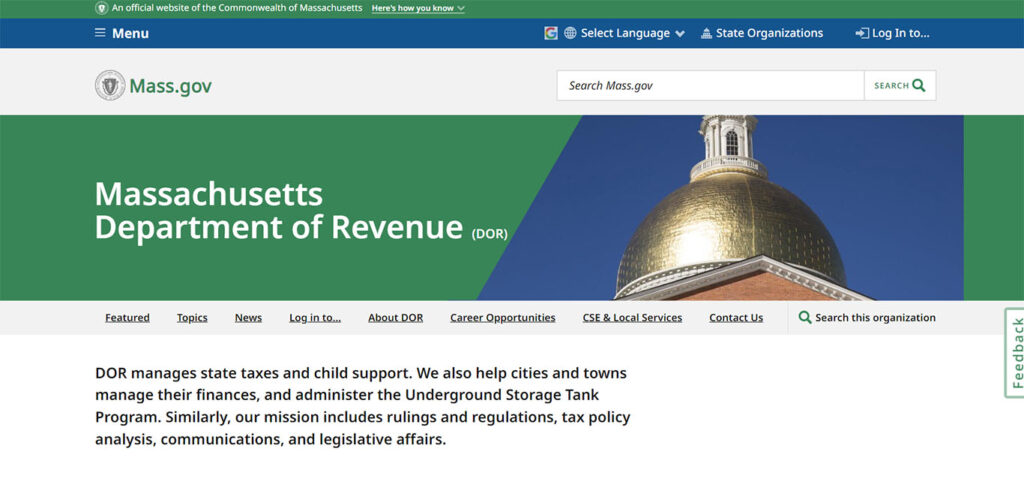The Massachusetts tax laws undergo some significant changes in 2023 that affect many taxpayers in the state. These changes include the introduction of a millionaires’ tax, an increase in the estate tax threshold, and a reduction in the short-term capital gains rate. The article helps you understand and comply with the new tax rules.
Massachusetts State Taxes – 2023 Update:
- Know What the Millionaires’ Tax Is
- Consider Surtax Filing Requirements and Payment Options
- Comprehend the Estate Tax Threshold
- Take Relevant Steps to Reduce Your Estate Tax Liability
- Know What Short-Term Capital Gains Rates Are
- Understand the Changes to Short-Term Capital Gains Rate
Recap
1. Know What the Millionaires’ Tax Is
www.mass.gov/orgs/massachusetts-department-of-revenue
The 2022 Massachusetts ballot introduces the “Millionaires’ Tax,” the Fair Share Amendment, or the Graduated Income Tax Amendment. This measure imposes a 4 percent surtax on annual taxable income exceeding $1 million, allocating the additional funds toward state education, transportation, and infrastructure.
For instance, if you earn $1.5 million in 2023, you owe an extra $20,000 in surtax (4% of the exceeding $500,000 beyond $1 million). Your total tax is $95,000, as the initial $1 million is taxable at the regular 5% rate, while the remaining amount is subject to the 9% surtax.
However, if your trust earns $2 million, the entire tax sum is at a 9% surtax rate, totaling $180,000. Conversely, an estate with $800,000 income in 2023 is subject to the surtax, paying a total of $40,000 at the regular 5% rate as it falls below the $1 million threshold. The amendment impacts high earners, contributing to essential public services.
>>>MORE: Idaho State Taxes: 2023 Update
2. Consider Surtax Filing Requirements and Payment Options
Your tax filing depends on your residency status and whether the Massachusetts surtax affects you. Residents use Form 1, while nonresidents or part-year residents file using Form 1-NR/PY. Attach Schedule HC-2, displaying your surtax calculation, with your return. To avoid penalties and interest, making tax payment estimates or having sufficient withholdings is crucial.
Plan your payments for April 15, June 15, September 15, and January 15 of the following year. Your employer or income payer deducts these withholdings from your earnings. Use Form 1-ES for tax payments or Form M-4 to adjust withholdings. If you need more details on filing requirements or payment methods for the surtax, consider visiting the DOR website or consulting a tax professional.
This guidance helps you navigate this process more effectively. Stay in the know and compliant to handle your taxes smoothly. For extra help, contact a tax professional or navigate the DOR website.
3. Comprehend the Estate Tax Threshold
The Massachusetts estate tax, the inheritance or death tax, applies to assets exceeding $1 million upon a person’s death. The recent Tax Fairness Act of 2023, raises the exemption to $2 million. This change means estates under $2 million are exempt, affecting about 80% of taxable estates. Only the amount over $2 million is subject to the tax, making it more proportional.
The adjustments, effective for individuals dying after January 1, 2023, offer various impacts. If under $2 million, it does not face estate tax, allowing its full wealth transfer. Estates worth over $2 million pay tax starting at a rate of 7.2% and reaching a maximum rate of 16%. Taxpayers can adjust estate plans to benefit from the new rules. It’s crucial for you to plan and seek professional advice to minimize estate tax liabilities and ensure a smoother wealth transfer.
>>>PRO TIPS: Ohio State Taxes: 2023 Update
4. Take Relevant Steps to Reduce Your Estate Tax Liability
To minimize estate tax, as a taxpayer, you have several effective strategies at your disposal. One approach involves making gifts of up to $15,000 annually per person without incurring a gift tax, reducing the taxable estate.
Trust creation is another powerful tool. For instance, a revocable trust grants control over assets during a taxpayer’s life, transferring the assets to beneficiaries upon death while bypassing probate. Alternatively, a charitable remainder trust provides income for a period before donating the remaining assets to a charity of choice, yielding tax deductions.
Additionally, purchasing life insurance can secure beneficiaries’ financial stability and lower estate tax. A life insurance trust, owning and managing the policy on your behalf, ensures that the policy’s proceeds evade inclusion in the taxable estate, remaining free from estate tax.
Although these strategies offer avenues for estate tax reduction, individual circumstances vary. Seeking guidance from an estate planner or attorney is essential due to the complexity of every unique situation. An attorney or estate planner with expertise provides specific solutions for effective estate planning.
5. Know What Short-Term Capital Gains Rates Are
Capital gains are the profits you make from selling things like stocks, real estate, or bonds. The money you pocket is the difference between how much you sold it for and what you initially paid. Capital gains fall into two categories: short-term and long-term. Short-term gains come from selling something you hold for a year or less, while long-term gains are from things you hold for over a year.
Tax rates on these gains vary. If you sell after holding for a short time, you pay the regular income tax rate, which is 8.5%. But, if you hold onto it for longer, the rates are more favorable—5%, based on your income bracket.
Knowing these rules is crucial for your financial planning. To lower your tax bill, consider timing your sales, balancing gains with losses, or looking into tax-advantaged accounts.
>>>GET SMARTER: West Virginia State Taxes: 2023 Update
6. Understand the Changes to Short-Term Capital Gains Rate
In December 2022, Governor Charlie Baker signs the Tax Fairness Act of 2023, reshaping Massachusetts’ tax landscape. The act cuts the short-term capital gains tax from 12% to 8.5%, effective January 1, 2023. This move aims for a fairer, more equitable tax system while supporting revenue for public services.
Its impact varies based on income and capital gains. Low to moderate earners with minimal gains do not notice much change. High earners with substantial gains enjoy a significant tax cut. Middle-income individuals with moderate gains experience a moderate tax reduction.
The new rates influence taxpayer behavior. With long-term gains, you sell sooner due to the lower 5% rate. With short-term losses, you hesitate to sell to offset losses and save less tax.
Economically, increased activity due to a reduced tax burden increases state revenue. This feeds into public services like education and infrastructure with funds from the millionaires’ tax. This tax shift slightly reduces income inequality and possibly boosts the investment climate, encouraging innovation and entrepreneurship in Massachusetts.
Recap
Updates on the Massachusetts State taxes 2023 include, first off, the ‘Millionaires’ Tax’ which refers to better tax on high-income individuals. It’s essential to understand the surtax filing requirements and payment methods to comply with these tax changes.
Also, knowing the estate tax threshold is crucial for estate planning. To reduce estate tax liability, taking relevant steps, such as gifting strategies, are beneficial.
Short-term capital gains rates involve taxes on profits from assets you hold for a short period. It’s important to grasp the changes in rates, which potentially affect investment strategies. Staying up-to-date and considering these aspects helps you manage your finances smartly.
This post is to be used for informational purposes only and does not constitute legal, business, or tax advice. Each person should consult his or her own attorney, business advisor, or tax advisor with respect to matters referenced in this post. . For comprehensive tax, legal or financial advice, always contact a qualified professional in your area. S’witty Kiwi assumes no liability for actions taken in reliance upon the information contained herein.









No Comment! Be the first one.